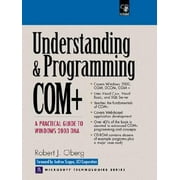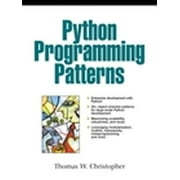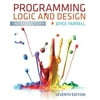Updated On July 25th, 2025
Looking for the best Programming Books? You aren't short of choices in 2022. The difficult bit is deciding the best Programming Books for you, but luckily that's where we can help. Based on testing out in the field with reviews, sells etc, we've created this ranked list of the finest Programming Books.
| Rank | Product Name | Score | |
|---|---|---|---|
| 1 |

|
Domain-Driven Design : Tackling Complexity in the Heart of Software (Hardcover)
Check Price
|
92%
|
| 2 |

|
Understanding and Programming COM+: A Practical Guide to Windows 2000 DNA
Check Price
|
0%
|
| 3 |

|
Python Programming Patterns (Paperback)
Check Price
|
0%
|
| 4 |

|
Modern Perl Programming
Check Price
|
0%
|
| 5 |

|
Programming Logic and Design, Introductory, Pre-Owned (Paperback)
Check Price
|
0%
|
| 6 |
![Data Structures And Algorithm Analysis in C++, Used [Hardcover] Data Structures And Algorithm Analysis in C++, Used [Hardcover]](https://i5.walmartimages.com/asr/26b78528-aaf4-446c-b0d6-a8a78720ba24.d8e3e6e742ec85bc8dba86ea424a8198.jpeg?odnHeight=450&odnWidth=450&odnBg=ffffff)
|
Data Structures And Algorithm Analysis in C++, Used [Hardcover]
Check Price
|
0%
|
| 7 |
![Large Problems, Small Machines : Transforming Your Problems with Advanced Algorithms, Used [Hardcover] Large Problems, Small Machines : Transforming Your Problems with Advanced Algorithms, Used [Hardcover]](https://i5.walmartimages.com/asr/fcaecbcd-3bcf-49f2-9772-dc15a4536786.6da032c76435caa2e0c7f94f97bfb77a.png?odnHeight=100&odnWidth=100&odnBg=ffffff)
|
Large Problems, Small Machines : Transforming Your Problems with Advanced Algorithms, Used [Hardcover]
Check Price
|
0%
|
| 8 |
![Opencv 2 Computer Vision Application Programming Cookbook, Used [Paperback] Opencv 2 Computer Vision Application Programming Cookbook, Used [Paperback]](https://i5.walmartimages.com/seo/Pre-Owned-Opencv-2-Computer-Vision-Application-Programming-Cookbook-Paperback-1849513244-9781849513241_138a0d4e-dd8e-4e2b-a693-c0369d079ca9.f57845de129df163954d1ee65f50eb89.jpeg?odnHeight=450&odnWidth=450&odnBg=FFFFFF)
|
Opencv 2 Computer Vision Application Programming Cookbook, Used [Paperback]
Check Price
|
0%
|
| 9 |
![CICS [Paperback - Used] CICS [Paperback - Used]](https://i5.walmartimages.com/asr/2e4ae634-4261-4397-a8b0-baa5d057ebde.b07dd5ab10247fc8be7a42f46501c43c.jpeg?odnHeight=180&odnWidth=180&odnBg=ffffff)
|
CICS [Paperback - Used]
Check Price
|
0%
|
| 10 |
![Cics/Esa Version 3: Architecture and Problem Determination (J RANADE IBM SERIES) [Hardcover - Used] Cics/Esa Version 3: Architecture and Problem Determination (J RANADE IBM SERIES) [Hardcover - Used]](https://i5.walmartimages.com/asr/3190a034-ef50-477a-a2b9-55b041392685.44d9100535a7cf6c7d3a16a00cd9aee6.png?odnHeight=180&odnWidth=180&odnBg=ffffff)
|
Cics/Esa Version 3: Architecture and Problem Determination (J RANADE IBM SERIES) [Hardcover - Used]
Check Price
|
0%
|

Our Score
"Domain-Driven Design" incorporates numerous examples in Java-case studies taken from actual projects that illustrate the application of domain-driven design to real-world software development. "Eric Evans has written a fantastic book on how you can make the design of your software match your mental model of the problem domain you are addressing. "His book is very compatible with XP. It is not about drawing pictures of a domain; it is about how you think of it, the language you use to talk about it, and how you organize your software to reflect your improving understanding of it. Eric thinks that learning about your problem domain is as likely to happen at the end of your project as at the beginning, and so refactoring is a big part of his technique. "The book is a fun read. Eric has lots of interesting stories, and he has a way with words. I see this book as essential reading for software developers--it is a future classic." --Ralph Johnson, author of Design Patterns "If you don't think you are getting value from your investment in object-oriented programming, this book will tell you what you've forgotten to do. "Eric Evans convincingly argues for the importance of domain modeling as the central focus of development and provides a solid framework and set of techniques for accomplishing it. This is timeless wisdom, and will hold up long after the methodologies du jour have gone out of fashion." --Dave Collins, author of Designing Object-Oriented User Interfaces "Eric weaves real-world experience modeling--and building--business applications into a practical, useful book. Written from the perspective of a trusted practitioner, Eric's descriptions of ubiquitous language, the benefits of sharing models with users, object life-cycle management, logical and physical application structuring, and the process and results of deep refactoring are major contributions to our field." --Luke Hohmann, author of Beyond Software Architecture "This book belongs on the shelf of every thoughtful software developer." --Kent Beck "What Eric has managed to capture is a part of the design process that experienced object designers have always used, but that we have been singularly unsuccessful as a group in conveying to the rest of the industry. We've given away bits and pieces of this knowledge...but we've never organized and systematized the principles of building domain logic. This book is important." --Kyle Brown, author of Enterprise Java(TM) Programming with IBM(R) WebSphere(R) The software development community widely acknowledges that domain modeling is central to software design. Through domain models, software developers are able to express rich functionality and translate it into a software implementation that truly serves the needs of its users. But despite its obvious importance, there are few practical resources that explain how to incorporate effective domain modeling into the software development process. Domain-Driven Design fills that need. This is not a book about specific technologies. It offers readers a systematic approach to domain-driven design, presenting an extensive set of design best practices, experience-based techniques, and fundamental principles that facilitate the development of software projects facing complex domains. Intertwining design and development practice, this book incorporates numerous examples based on actual projects to illustrate the application of domain-driven design to real-world software development. Readers learn how to use a domain model to make a complex development effort more focused and dynamic. A core of best practices and standard patterns provides a common language for the development team. A shift in emphasis--refactoring not just the code but the model underlying the code--in combination with the frequent iterations of Agile development leads to deeper insight into domains and enhanced communication between domain expert and programmer. Domain-Driven Design then builds on this foundation, and addresses modeling and design for complex systems and larger organizations.Specific topics covered include: Getting all team members to speak the same language Connecting model and implementation more deeply Sharpening key distinctions in a model Managing the lifecycle of a domain object Writing domain code that is safe to combine in elaborate ways Making complex code obvious and predictable Formulating a domain vision statement Distilling the core of a complex domain Digging out implicit concepts needed in the model Applying analysis patterns Relating design patterns to the model Maintaining model integrity in a large system Dealing with coexisting models on the same project Organizing systems with large-scale structures Recognizing and responding to modeling breakthroughs With this book in hand, object-oriented developers, system analysts, and designers will have the guidance they need to organize and focus their work, create rich and useful domain models, and leverage those models into quality, long-lasting software implementations.
• Author: Eric Evans,Ross Venables • ISBN:9780321125217 • Format:Hardcover • Publication Date:2003-08-20

Our Score
short description is not available
Other, Prentice Hall PTR, 1999, ISBN13 9780130231147, ISBN10 0130231142

Our Score
The goal of this book is to prepare readers to write medium to large size programs in Python - by this we mean containing thousands of lines of codes. This book will teach both the Python programming language and large-scale programming using object-oriented techniques.
The real-world guide to enterprise-class Python development!Enterprise development with Python!20+ object-oriented patterns for large-scale Python developmentMaximizing scalability, robustness, and reuseLeveraging modularization, toolkits, frameworks, metaprogramming, and morePython isn't just a tool for creating short Web scripts and simple prototypes: its advantages are equally compelling in large-scale development. In "Python Programming Patterns," Thomas Christopher shows developers the best ways to write large programs with Python, introducing powerful design patterns that deliver unprecedented levels of robustness, scalability, and reuse. Christopher teaches both the Python programming language and how to "program in the large" with Python, using objects, modularization, toolkits, frameworks, and other powerful tools and techniques. 20+ proven object-oriented patterns for large-scale Python development: creational, structural, and behavioralLeverage the skills you've mastered in other object-oriented languagesDesign Python systems for maximum reuseCreate cleaner, more comprehensible software systemsMake the most of persistence, concurrent programming, functional programming, and metaprogramming Includes extensive working code and meaningful examplesIf you've ever thought it would be great to use Python in real enterprise development, you're about to learn how--with "Python Programming Patterns"!

Our Score
The complete Perl learning resource for novices and experienced programmers alike, with advanced coverage that highlights GUI development, networking applications, real database integration, and much more. Includes many clear examples of using references (pointers)--the cornerstone of all advanced Perl development.
Paperback, Prentice Hall, 2002, ISBN13 9780130089656, ISBN10 0130089656

Our Score
Pre-Owned -
Programming Logic and Design, Introductory, Pre-Owned (Paperback)
![Data Structures And Algorithm Analysis in C++, Used [Hardcover] Data Structures And Algorithm Analysis in C++, Used [Hardcover]](https://i5.walmartimages.com/asr/26b78528-aaf4-446c-b0d6-a8a78720ba24.d8e3e6e742ec85bc8dba86ea424a8198.jpeg?odnHeight=450&odnWidth=450&odnBg=ffffff)
Our Score
Mark Allen Weiss' innovative approach to algorithms and data structures teaches the simultaneous development of sound analytical and programming skills for the advanced data structures course. Readers learn how to reduce time constraints and develop programs efficiently by analyzing the feasibility of an algorithm before it is coded. The C++ language is brought up-to-date and simplified, and the Standard Template Library is now fully incorporated throughout the text. This Third Edition also features significantly revised coverage of lists, stacks, queues, and trees and an entire chapter dedicated to amortized analysis and advanced data structures such as the Fibonacci heap. Known for its clear and friendly writing style, Data Structures and Algorithm Analysis in C++ is logically organized to cover advanced data structures topics from binary heaps to sorting to NP-completeness. Figures and examples illustrating successive stages of algorithms contribute to Weiss' careful, rigorous and in-depth analysis of each type of algorithm.
Data Structures and Algorithm Analysis in C++, Used [Hardcover]
![Large Problems, Small Machines : Transforming Your Problems with Advanced Algorithms, Used [Hardcover] Large Problems, Small Machines : Transforming Your Problems with Advanced Algorithms, Used [Hardcover]](https://i5.walmartimages.com/asr/fcaecbcd-3bcf-49f2-9772-dc15a4536786.6da032c76435caa2e0c7f94f97bfb77a.png?odnHeight=100&odnWidth=100&odnBg=ffffff)
Our Score
This text shows how to write software that allows rapid execution of programs using a minimum of system resources. It examines an actual software project and illustrates optimization as it exists in the real world.
Large Problems, Small Machines : Transforming Your Problems with Advanced Algorithms, Used [Hardcover]
![Opencv 2 Computer Vision Application Programming Cookbook, Used [Paperback] Opencv 2 Computer Vision Application Programming Cookbook, Used [Paperback]](https://i5.walmartimages.com/seo/Pre-Owned-Opencv-2-Computer-Vision-Application-Programming-Cookbook-Paperback-1849513244-9781849513241_138a0d4e-dd8e-4e2b-a693-c0369d079ca9.f57845de129df163954d1ee65f50eb89.jpeg?odnHeight=450&odnWidth=450&odnBg=FFFFFF)
Our Score
This is a cookbook that shows results obtained on real images with detailed explanations and the relevant screenshots. The recipes contain code accompanied with suitable explanations that will facilitate your learning. If you are a novice C++ programmer who wants to learn how to use the OpenCV library to build computer vision applications, then this cookbook is appropriate for you. It is also suitable for professional software developers wishing to be introduced to the concepts of computer vision programming. It can be used as a companion book in university-level computer vision courses. It constitutes an excellent reference for graduate students and researchers in image processing and computer vision. The book provides a good combination of basic to advanced recipes. Basic knowledge of C++ is required.
Opencv 2 Computer Vision Application Programming Cookbook, Used [Paperback]
![CICS [Paperback - Used] CICS [Paperback - Used]](https://i5.walmartimages.com/asr/2e4ae634-4261-4397-a8b0-baa5d057ebde.b07dd5ab10247fc8be7a42f46501c43c.jpeg?odnHeight=180&odnWidth=180&odnBg=ffffff)
Our Score
CONDITION - USED - Pages can include limited notes and highlighting, and the copy can include "From the library of" labels or previous owner inscriptions. Accessories such as CD, codes, toys, may not be included. The most comprehensive and useful CICS handbook available anywhere... This comprehensive handbook offers systems programmers the inside story on the internal structure of CICS--information you won't find in the official manuals, information that was previously available only through expensive classes. You will learn how the major CICS components, tables, and control blocks interact and how to use this knowledge to diagnose and solve performance problems, reduce down-time, and make your system run the way the sales rep said it would. CICS expert Eugene S. Hudders covers all versions of mainframe CICS: CICS/VS, CICS/MVS, CICS/ESA, and CICS/VSE. His extensive coverage of CICS/ESA (version 3) is not currently available from any other source, and the figures used to support that coverage are unique to this book. Every chapter is supplemented with numerous figures to illustrate and clarify the concepts presented. Hudders's nuts-and-bolts approach to often complex issues stresses practical considerations to help systems managers streamline the technical support function. Topics covered include: * Major CICS control blocks and chains * Storage, task, program, and file control programs * Table management program * Terminal control program, temporary storage, and transient data * CICS/ESA domains, including kernel domain, dispatcher domain, loader domain, and others * Transaction manager program and storage manager * And much more
CICS [Paperback - Used]
![Cics/Esa Version 3: Architecture and Problem Determination (J RANADE IBM SERIES) [Hardcover - Used] Cics/Esa Version 3: Architecture and Problem Determination (J RANADE IBM SERIES) [Hardcover - Used]](https://i5.walmartimages.com/asr/3190a034-ef50-477a-a2b9-55b041392685.44d9100535a7cf6c7d3a16a00cd9aee6.png?odnHeight=180&odnWidth=180&odnBg=ffffff)
Our Score
CONDITION - USED - Pages can include limited notes and highlighting, and the copy can include "From the library of" labels or previous owner inscriptions. Accessories such as CD, codes, toys, may not be included. This text should help systems and applications programmers solve many of the problems they encounter while using CICS/ESA. Guidelines and methodologies, as well as troubleshooting techniques offer the reader the opportunity for quick resolution of a wide variety of CICS problems. The reference devotes a section to the internal design and control block structure of the CICS/ESA version 3, as well as a separate section devoted solely to application and systems programmers' problems and concerns.
Cics/Esa Version 3: Architecture and Problem Determination (J RANADE IBM SERIES), Used [Hardcover]